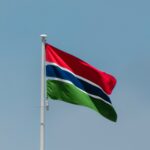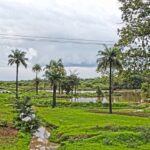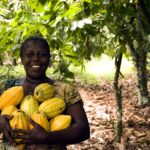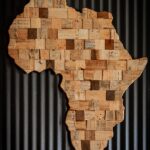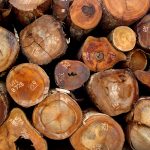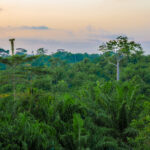
For over 40 years, Senegal’s Casamance region – a strip south of The Gambia – has been the primary source of illegally traded rosewood. The region has been embroiled in an insurgency between the separatist Movement of Democratic Forces of Casamance and Senegal’s government. The separatists rely on the illicit rosewood trade to fund their insurgency.
Also published here: Illegal logging cuts deep into The Gambia’s ecology and economy | ENACT Africa
The Regional Forestry Office in Lower River Region (LRR) has allegedly proceeded with the sale on Friday, 7th June 2024 of logs illegally cut from the forest and confiscated by the people of Nioro Jattaba. An initial attempt by the Regional Forestry Office to sell the logs before questioning any suspects or bringing the matter before the justice system was rejected by the Nioro community.
A team led by Tanzanian remote-sensing scientist Robert Masolele used high-resolution satellite data and deep-learning techniques to draw up a map identifying the drivers of forest conversion in Africa.
The research shows that most deforested land on the continent is turned into small-scale farms, with the Democratic Republic of Congo and Madagascar being hotspots for this pattern of forest loss.
With better remote-sensing data, researchers can pinpoint where agriculture is eating into forested areas and where cash crops are replacing woodland. In this work, the group focused on commodity crops like cacao, oil palm, rubber and coffee, which are targeted under the European Union’s recently enacted rules to restrict import of crops linked to deforestation.
Over three million tons of West African Rosewood have been shipped to China since 2017. The logs are manufactured into high-end Chinese furniture and exported worldwide as part of a multi-billion dollar furniture industry.
In November, Wood Central reported that CITES had banned the felling, transportation, and exportation of West African Rosewood in response to Chinese traders’ “industrial-scale” exploitation of the timbers. That move, according to environmental watchdog forest-trends, is an acknowledgment that past measures to protect the species, known as P. erinaceus, have “not worked and that CITES Parties (who are responsible for the measures to verify the legality and sustainability of trade, have not been able to eradicate illegal trade alone.”
Now, a new report by the Environmental Investigation Agency alleges that the multi-billion dollar trade is showing no signs of slowing, despite CITES and the Gambian government’s both introducing outright bans on the harvest and distribution of the timbers.
The Nioro Jattabacommunity impounded logs suspected to be illegally cut from their communal forest. This latest incident comes amidst a growing concern over the rapid depletion of trees in the area. The community reported discovering about 20 endangered trees recently felled without authorisation from the village head (Alkalo) or the forestry authorities. This adds to the estimated hundreds of trees already lost in recent months.
The first high-resolution (5 m) and continental-scale
mapping of land use following deforestation in Africa, including humid and dry forests.
Results show, not surprisingly, that the causes of forest loss vary by region. In general, small-scale cropland is the
dominant driver of forest loss in Africa, with hotspots in Madagascar and DRC. In addition, commodity
crops such as cacao, oil palm, and rubber are the dominant drivers of forest loss in the humid forests of
western and central Africa, forming an “arc of commodity crops” in that region. At the same time, the
hotspots for cashew are found to increasingly dominate in the dry forests of both western and southeastern Africa, while larger hotspots for large-scale croplands were found in Nigeria and Zambia.
The Gambia Environmental Alliance (GEA) on Wednesday raised an eyebrow at the alleged illegal logging of trees in Kaiaf.
In a shared statement with this medium on Wednesday, June 7 2023 Gambia Environmental Alliance stated in it that the community forest of Kaiaf has fallen victim to a catastrophic event which they described as devastating and illegal destruction of both mature and young forest trees for the production of charcoal and firewood. The people of Kabada are alleged of this act.
On Friday, the West African nation of The Gambia banned timber exports and permanently revoked all timber export licenses with immediate effect.
The ban targets timber of the highly prized African Rosewood tree, which is native in West and Central Africa. It has been nearly extinct since 2011.
Following the ban, the government instructed port authorities to refuse loading of timber logs onto any vessel. In addition, random searches of containers should be heightened.
When current president Adama Barrow came into power in January 2017, one of his top priorities was to stamp out illegal logging of rosewood timber. However, he stopped short of a full export ban at the time.
Banjul, The Gambia — With the endorsement of Cabinet chaired by His Excellency President Adama Barrow on Thursday and in line with Section 113 of the Forest Act, 2018, the Ministry of Environment, Climate Change and Natural Resources (MECNARR) wishes to inform the public of these new regulations effective immediately:
- All existing permits issued for the export/re-export of timber are permanently revoked;
- The export/re-export of timber is banned;
- The felling and/or import of Pterocarpuserinaceus locally known as KENO is banned;
- The felling of Cordyla Africana, locally known as Wulakonoduto, Dimba or wild mango is banned
- All timber cleared for import by the Department of Forestry, must have complete and duly certified import documentation including bills of laden showing proof of transport, as well as Customs entries for every border it crossed before entering The Gambia, to avoid its forfeiture to the State upon arrival;
- Timber for domestic use could be transported within The Gambia provided the carriers have authentic permits for household use duly issued by the Department of Forestry.
This post written by Foday Manneh first appeared in The Alkamaba Times on June 13, 2022. This edited version is being republished on Global Voices under a content partnership agreement.
On May 6, a large number of trees harvested for timber were found felled in Kundam, a village in the Tumana District in The Gambia’s Upper River Region (URR). In this community forest reserve, it is illegal to fell trees without a license.
Salif Sadio, the leader MFDC rebels has dismissed claims that his men are engage into illegal timber logging trade, adding that part of their deals for independence is to end illegal timber trade in the region.
Speaking to reporters over the weekend, he said: “we are fighting illegal timber logging and that’s part of our conditions for our freedom because any timber you see in Senegal comes either from Casamance or The Gambia or other countries. It is not true, they are lying.
Gambia and Senegal have started a joint initiatives to combat illegal timber trade in Casamance, Senegal’s troubled south that has been dealing with rebellion since in the 1980s. The Gambian leader Adama Barrow told journalists on Tuesday that he and his Senegalese counterpart Macky Sall are doing everything to combat illegal logging.
Click here to access the Global Illegal Logging and Associated Trade (ILAT) Risk assessment tool and to download the Forest Trends User Guide describing the functionality of the ILAT Risk Data Tool.
Click here to access the Cattle Data Tool.

